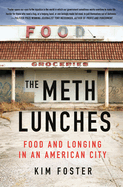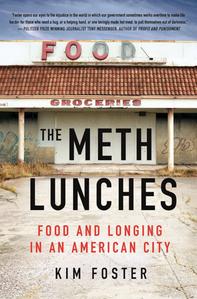
 James Beard Award-winning food writer Kim Foster ("The Dysfunction of Food") expands on her previous essays in The Meth Lunches, a memoir that takes readers on a precarious culinary journey through addiction, poverty, and the U.S. foster care system against the backdrop of the bright lights and desert landscape of Las Vegas.
James Beard Award-winning food writer Kim Foster ("The Dysfunction of Food") expands on her previous essays in The Meth Lunches, a memoir that takes readers on a precarious culinary journey through addiction, poverty, and the U.S. foster care system against the backdrop of the bright lights and desert landscape of Las Vegas.
Foster and her husband moved from New York City to Las Vegas with their two young daughters, surprising themselves by falling in love with their arid new home. Foster even loves their downtown grocery store, which her neighbors would gladly trade for a Whole Foods. She enmeshes her family in the community largely through feeding people, and along the way, she sees a variety of intersections between food and poverty. "What we are eating and how we are eating tells us something integral about how we are doing, what our lives are like," she realizes.
The Fosters learn about the nearly inescapable grasp of meth addiction from Charlie, a day laborer they hire and get to know through daily lunches together. Foster lives her dream of serving as a foster parent and becomes intimately acquainted with the profound mental effects of starvation on children through her adopted son, whose early experiences leave him with the impulse to both refuse and hoard food. She runs a neighborhood food pantry during the Covid-19 pandemic, giving rise to a micro-community that highlights the best and worst human impulses. Through the pantry, Foster meets an unhoused woman who grows produce in her van. She outlines the entanglement of food, dignity, and individualism, the lack of humanity in many institutionalized food aid programs, and the creativity that allows food to make people feel human in inhumane places.
Foster unflinchingly lays bare the reality of poverty and hunger in America, combining statistics with the true life stories of people in her own sphere. Prejudice, predatory housing practices, and poor access to care for people with severe mental illnesses all rise into sharp, frustrating relief. Foster may occasionally be guilty of saviorism, but she also freely admits it, and acknowledges her past biases as well as her personal growth. She openly discusses her own mental health and the limits of her focus. Her meditations on community and caring for others encourage readers to consider the building of a world where everyone has a place at a full, loving table. Book clubs should relish this call to action. --Jaclyn Fulwood, blogger at Infinite Reads
Shelf Talker: James Beard Award-winner Kim Foster examines food and poverty in the U.S. through the lens of Las Vegas, Nev., her own community.

